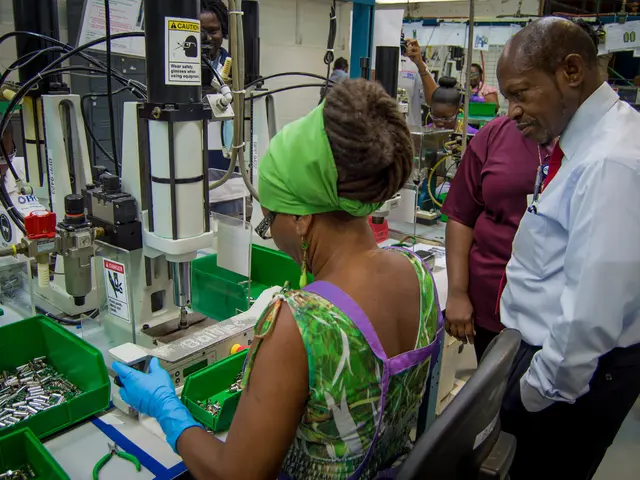Farms Maintains "Honest" Approach Amidst Critique of Questionable Business Strategies Used by Some Corporations
Cage-Free Eggs: The Misleading Humane Choice?
Opting for cage-free eggs might seem like the ethical choice, primarily due to widespread advertising. However, the reality is far less appealing. These hens typically only have around 1 square foot of space to move around.
Vital Farms, known for its no-nonsense approach, vividly demonstrates this cramped quarters in a recent campaign, portraying a claustrophobic office scenario where office workers are packed together, mirroring the plight of those confined hens. It's quite amusing to watch these poor individuals trying to navigate in such close quarters. But the brand isn't just entertaining; it's making a serious statement about greenwashing. Additional spots also call out superficial corporate initiatives and dismal work conditions.
Greenwashing refers to the deceptive claims about a product or company's environmental or ethical benefits, often making consumers believe in false sustainability and animal welfare principles. In the context of cage-free egg production, companies may use terms like “cage-free” or “regenerative agriculture” in their marketing, implying improved animal welfare or environmental responsibility. However, actual conditions may not align with these ideals.
While Vital Farms indeed prioritizes pasture-raised, humane egg production, greenwashing concerns often arise in the broader industry. For instance, some producers label their eggs as "cage-free," keeping hens in crowded, industrial settings with minimal access to the outdoors. This practice is far from the ideal connotation associated with cage-free eggs. In such cases, the term "cage-free" might be technically correct, but the living conditions fall far short of what consumers generally expect.
The Implications of Greenwashing in Cage-Free Egg Production
- Bewildered Consumers: Misleading greenwashing claims can lead consumers to believe they are making a more ethical or sustainable choice, whereas the product's impact pales in comparison to genuinely humane or sustainable alternatives, such as pasture-raised eggs.
- Eroded Trust: Frequent exposure to deceptive claims can make consumers skeptical of all ethical or environmental labeling, potentially affecting trust even for brands with high standards.
- Weakened Animal Welfare Standards: By using greenwashing to escape stricter welfare standards, companies can hinder the progress towards enhancing farm animal lives.
- Market Distortion: Brands engaging in greenwashing can outcompete genuinely responsible producers by projecting a false image, making it challenging for consumers and regulators to distinguish truth from deception.
While Vital Farms primarily focuses on transparency and actual pasture-based systems in its marketing campaigns, the issue of greenwashing becomes particularly relevant in the wider industry's use of cage-free labeling to conceal inadequate welfare conditions. As consumers, it's crucial to look beyond simple labels to comprehend the true impact of our egg purchases.
- In the realm of cage-free egg production, where labels like 'cage-free' might be used, consumers might be misled to believe they are making a more ethical choice, overlooking the questionable welfare conditions that often fall short of the ideal.
- The practice of 'greenwashing' in the egg industry can lead to a market distortion, where brands with poor welfare practices outcompete genuine, responsible producers, making it difficult for consumers and regulators to discern truth from deception.
- As awareness about greenwashing grows, the erosion of consumer trust can extend beyond specific brands, potentially affecting the credibility of all environmental and ethical labeling in sectors such as 'health-and-wellness', 'lifestyle', 'finance', and 'food-and-drink', industries that are increasingly mindful of their social and environmental impact.








